İKİ MAKİNE AKIŞ TİPİ ÖĞRENME ETKİLİ ÇİZELGELEMEDE ORTAK TESLİM TARİHİNDEN MUTLAK SAPMALARIN EN KÜÇÜKLENMESİ
Çizelgeleme, akış tipi, E/G tamamlanma, öğrenme etkisi, tamsayılı programlama.
___
- Yağmahan B. ve Yenisey M.M., Akış tipi
- çizelgeleme problemi için KKE parametre
- eniyileme, İTÜ Dergisi, 5 (2), 133-141, 2006.
- Biskup D., A State-Of-The-Art Review on
- Scheduling with Learning Effects, European
- Journal Of Operational Research, 188, 315-329,
- -
- Yelle L.E., The Learning Curve: Historical
- Review and Comprehensive Survey, Decision
- Science, 10, 302-328, 1979.
- Wright T.P., Factors Affecting The Cost Of
- Airplanes, Journal Of The Aeronautical
- Sciences, 3, 122-128, 1936.
- Eren T. ve Güner E., Öğrenme Etkili Akış Tipi
- Çizelgelemede Ortalama Akış Zamanının En Küçüklenmesi, Gazi Ünv. Müh. Mim. Fak. Der.,
- , 119-124, 2004.
- Biskup D., Single-Machine Scheduling with
- Learning Considerations, European Journal Of
- Operational Research, 115, 173-178, 1999.
- Lee W.C. and Wu C.C., Minimizing total
- completion time in a two-machine flowshop with
- a learning effect, International Journal of
- Production Economics, 88, 85-93, 2004.
- Chen P., Wu C.C. and Lee W.C., A bi-criteria
- two-machine flowshow scheduling problem with a
- learning effect, Journal of the Operational
- Research Society, 57, 1113-1125, 2006.
- Cheng M.B., Sun S.J. and Yu Y., A note on flow
- shop scheduling problems with a learning effect
- on no-idle dominant machines, Applied
- Mathematics and Computation, 184, 945-949,
- -
- Fisher M.L., A dual algorithm for the one-machine
- scheduling problem, Mathematical
- Programming, 11, 229–251, 1976.
- Wu C.C., Lee W.C. and Wang W.C., A twomachine
- flowshop maximum tardiness scheduling
- problem with a learning effect, International
- Journal of Advanced Manufacturing
- Technology, 31, 743-750, 2007.
- Baker K.R., Elements of sequencing and
- scheduling, Dartmounth College, Hanover, 1997.
- Lauff V. and Werner F., Scheduling with
- Common Due Date, Earliness and Tardiness
- Penalties for Multimachine Problems: A Survey,
- Mathematical and Computer Modelling, 40 (5-
- , 637-655, 2004.
- Ventura J.S., Kim D. and Garriga F., Single
- machine earliness-tardiness scheduling with
- resource-dependent release dates, European
- Journal of Operational Research, 142, 52-69,
- -
- Sarper H., Minimizing the sum of absolute
- deviations about a common due date for the twomachine
- flow shop problem, Applied
- Mathematical Modelling, 19 (3), 153-161, 1995.
- Hendel Y. and Sourd F., An improved earlinesstardiness
- timing algorithm, Computers&Operation
- Research, 34, 2931-2938, 2007.
- Sakuraba C.S., Ronconi D.P. and Sourd F.,
- Scheduling in a two-machine flowshop for the
- minimization of the mean absolute deviation from
- a common due date, Computers&Operations
- Research, 36 (1), 60-72, 2009.
- Mosheiov G., Scheduling problems with a
- learning effect, European Journal of
- Operational Research, 132, 687–693, 2001.
- Mosheiov G. and Sidney J.B., Scheduling with
- general job-dependent learning curves, European
- Journal of Operational Research., 147, 665-670,
- -
- Biskup D. and Simons, D., Common due date
- scheduling with autonomous and induced learning.
- European Journal of Operational Research,
- , 606–616, 2004.
- Kuo W.H. and Yang D.L., Single machine
- scheduling with past-sequence-dependent setup
- times and learning effects, Information
- Processing Letters, 102, 22-26, 2007.
- Toksarı M.D. and Güner E. Parallel machine
- earliness/tardiness scheduling problem under the
- effects of position based learning and linear/nonlinear
- deterioration, Computers&Operations Research, 36
- (8), 2394-2417, 2008.
- Chou F.D. and Lee C.E., Two-machine Flowshop
- Scheduling with Bicriteria Problem,
- Computers&Industrial Engineering, 36 (3),
- -564,1999.
- ISSN: 1300-1884
- Yayın Aralığı: 4
- Başlangıç: 1986
- Yayıncı: Oğuzhan YILMAZ
VİDEO DİZİLERİNDE AYRIT SEZMEYE DAYALI HIZLI HAREKET KESTİRİMİ
BİLYALI RULMAN YEREL KUSURLARININ NEDEN OLDUĞU TİTREŞİMLERİN MODELLENMESİ
Önder Yaşar ÖZGÖREN, Selim ÇETİNKAYA
Diklorotriazin reaktif boyarmaddesi sentezi ve selülozik elyafa uygulanması
Ayşe MURATHAN, Pelin FİDANOĞLU
Ahmet Necati ÖZSEZEN, Mustafa ÇANAKCI
ASFALT ÇİMENTOLARINDA DUKTULİTENİN BULANIK MANTIKLA TAHMİNİ
Aytegül GELEN, Tankut YALÇINÖZ
Yaşar ÖZGÖREN, Selim ÇETİNKAYA
Dikimevi Beşevler hattındaki otobüs ve raylı sistemin karşılaştırması
